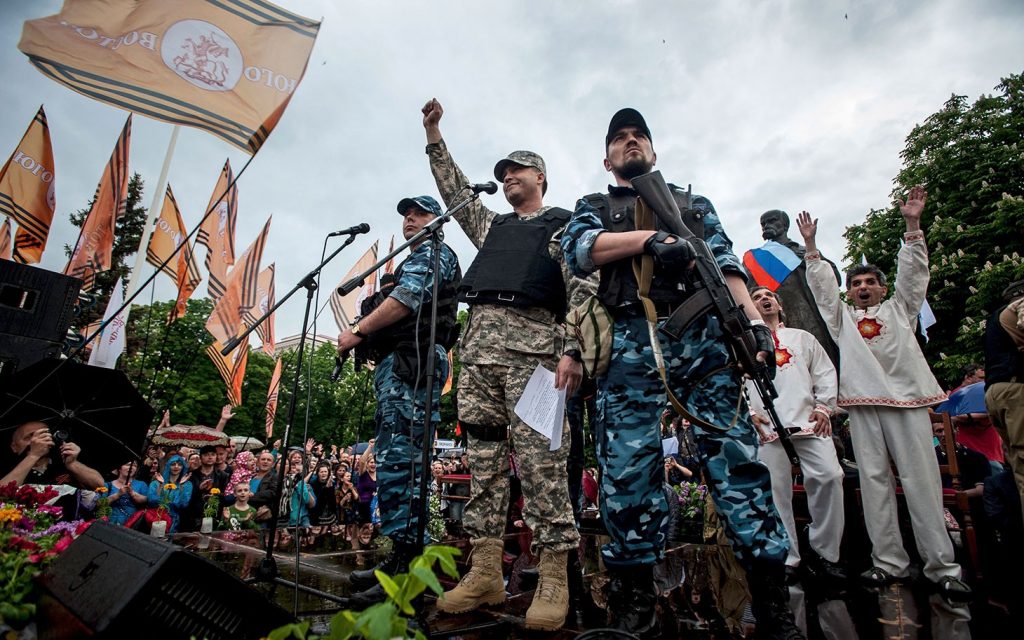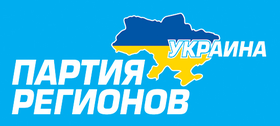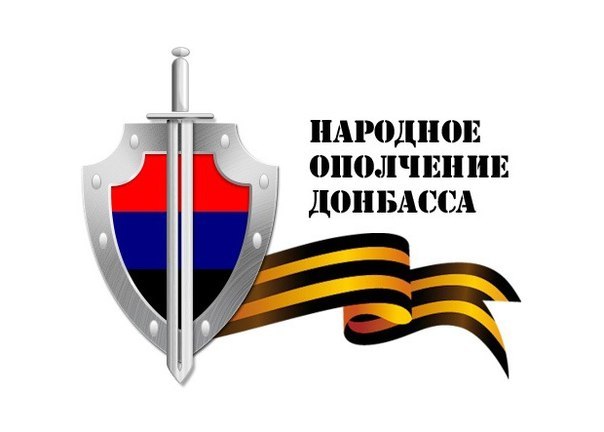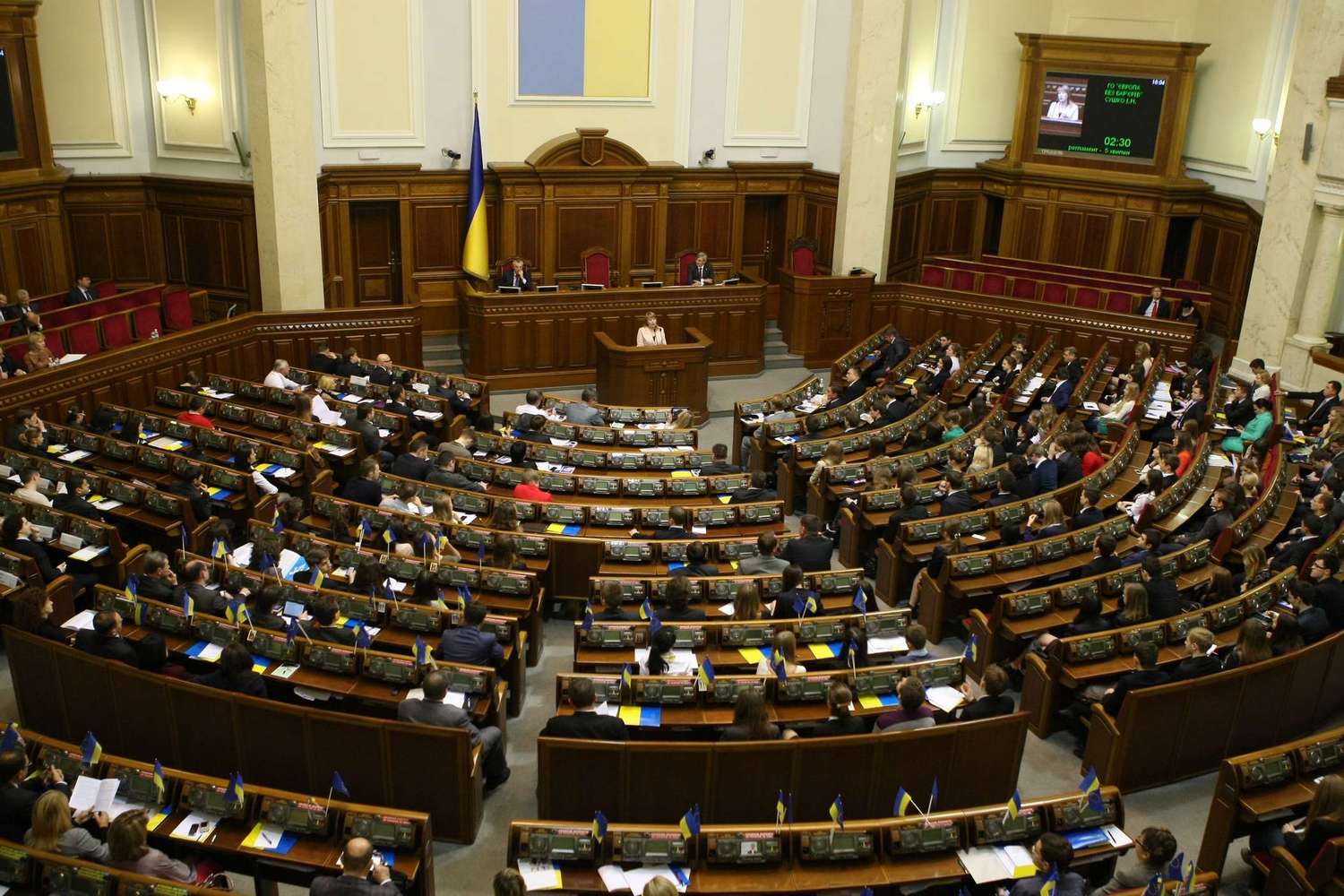By Daria Platonova

The causes of war in eastern Ukraine (or between the Ukrainian government and Donetsk People’s Republic and Luhansk People’s Republic) have been interpreted in a wide variety of ways. Two main interpretations emerge: endogenous, that is an interpretation seeking indigenous roots of the conflict, and exogenous, that is looking at the role of Russia. In her recent book, Anna Matveeva, argues that one of the causes of the war was the peculiar behaviour of the local elites in Donetsk and Luhansk region. This article seeks to give some empirical grounding to this idea in a theoretically-attuned way by looking at some statements and actions of the local elites in Donetsk preceding the violent events of April 2014. I also look at how these actions and statements were interpreted by one of the key pro-Russian activists, Pavel Gubarev, who headed the pro-Russian protest for a short period of time.
Theories of conflict[1] predict that the local elites are key to mobilisation and act as catalysts in the protest evolving into a civil war. They do so by engaging in manipulating arising emotions and channelling to protect their hold on power. The research, particularly on ethnic conflicts, demonstrates that elites construct ethnic appeals and manipulate ancient hatreds in order to mobilise people along ethnic lines.[2] Kalyvas argues that, in a situation resembling security dilemma, elites will use popular emotions of fear to their own ends.[3]
What we witnessed in the Donbas however was a rather confusing and erratic behaviour of the elites at best, sending mixed signals to the population. On the 22nd of February 2014 immediately after Yanukovych left Kyiv and even before Turchynov was elected the speaker, the deputies of all levels from south-eastern Ukrainian regions, Crimea, and Simferopol, organised an urgent congress in Kharkiv. Andriy Shishatsky, the governor of Donetsk oblast, governors of four Russian regions,[4] and some Russian representatives, such as Aleksey Pushkov, were present. During the congress, they voiced their opposition to “fascism”, called for unity of Ukraine, refused to comply with the orders coming from Kyiv, and announced the creation of the alternative power base, passing all the reins of power to the local councils and administrations.[5] The participants at the congress were immediately labelled as separatists by the Ukrainian press.[6]
After this “brave” congress however, the vast majority of the local elites moved to recognise the new government. On the 23rd of February 2014, Shishatsky issued a statement in which he described his meeting with Rinat Akhmetov (the richest oligarch in Ukraine and the owner of the major industrial enterprises in the Donbas) and “other respected people” of Donetsk. The governor posted a message on the website of the regional administration stating that “all of them see the future, our common future in indivisible, integral, and independent Ukraine.”[7] On the following day, Shishatsky stated that he recognised the Rada as the only legitimate power body in the country.[8] On the 25th of February 2014, Donetsk mayor Oleksandr Luk’yanchenko stated at a press conference that he recognised the Verkhovna Rada as the only legitimate government body in the country, effectively swearing allegiance to the new government, as did Shishatsky.[9]
What explains this kind of behaviour? It is quite probable that, due to the change of government, at first, the elites were gripped by fear, both for their lives and for their status. Barbalet writes on the elite fear: “elites may fear that their privileged position is threatened when the system they dominate undergoes a relative shift in power relations 149”. Party of Regions, the dominant party in south-eastern Ukraine, in particular, had grounds for fear, both due to the major exodus of their colleagues - by the 23rd of February 2014 more than 76 MPs were lost by the party[10] - and direct threats to their livelihoods and security emanating from the radical groups in Kyiv. Kharkiv mayor Hennadyi Kernes, for example, claimed to have been threatened with violence personally.[11] Oleg Tsarev described at length the extreme pressure the deputies were put under during the Verkhovna Rada voting: “I called my friend Vitaly Grushevski. He did not respond. Then I called his aide, who told me that Grushevski has been beaten up next to the Parliament. They have taken voting cards from some deputies and started voting on their behalf. It is possible that some deputies from whom the cards have been taken are locked up somewhere in the Rada. There is no Symonenko (Communist Party of Ukraine –DP), nor many other deputies, who were beaten up earlier, in the Rada. But now somebody is calling me and pretending to be Mikhail Chechetov, with a voice which does not sound like his at all, telling me that I should leave Ukraine urgently. Otherwise, I will be arrested. I told him… that I am not going to leave Ukraine.”[12]

After this initial spell of helplessness, the local elites seem to have engaged in bargaining with the central government in order to protect their hold on power. Throughout the pre-war period, they would engage in federalisation referendum talks with the government and appeasement of the radical groups, which to many experts and journalists, was an indication of their desire to protect their power.
Not only gripped by fear and the desire to stay in power, after the flight of Yanukovych, many party members engaged in soul-searching, which continued throughout the pre-war period and precluded them from becoming good intermediaries between the region and the central government. During the Donetsk city council meeting on the 28th of February 2014, Nikolai Levchenko,[13] who later became the head of Party of Regions in Donetsk and a very important influence on the situation in Donetsk, was also sending extremely confusing signals to activists and the rest of the audience. He claimed that “today the leaders of the opposition parties find themselves in government as a result of pressure from the street (“stikhiino”)”. He was expecting armed units to come from the Maidan to the regions to attack and burglar homes. “It is true that the government is now in the hands of nationalist radicals”, he stated, “we have no rights”. At the same time, Levchenko revealed that he voted for Yatseniuk for the purpose of safety, due to the power vacuum in the country. Party of Regions, he said, as an opposition party, had the right to protection, according to the European Convention on Human Rights. Significantly, Levchenko endorsed Pavel Gubarev by saying that “he is 90% right”.[14] For the bulk of his speech, Levchenko blamed the fugitive government for what had happened in the country. He also said the party was misled and betrayed by Yanukovych, and that he felt guilty for having supported the president, whom no one could control any more after he assumed power in 2010.
This erratic behaviour of the elites, with their endorsement of both the new government and pro-Russian activists, seems to have been increasingly irrelevant to the pro-Russian movements. These pro-Russian movements, particularly Pavel Gubarev, seem to have decided to take matters into their own hands which contributed to the final outcome, that is the violent confrontation. Gubarev, for example, later claimed to have provided key intelligence and resources to Igor Strelkov, who started the insurgency in Slavyansk. Below I illustrate how Gubarev came to the realisation that he could not rely on the local elites.
Many people felt they were left to fend for themselves[15] and the word “people” (“narod”) increasingly gained currency on social media. There were many comments on the Kharkiv mayor Kernes and governor Dobkin, who were extremely quick to find a compromise with the new elites in Kyiv, with the words, such as abandoned (“kinuli”) or rat out (“slili”) in describing their attitude towards the people. An extremely popular pro-Russian blogger Boris Rozhin commented on the congress of the 22nd of February 2014 as a “total abandonment (“sliv”) of the people by the elites”. Reflecting back on the events of 2014, Mustafa Nayyem, a prominent Ukrainian journalist, said he believed neither Kernes nor Levchenko cared much for the people, with Kernes being able to “survive under any regime”.[16]

Significantly, despite Levchenko’s endorsement of Gubarev, the latter was adamant that he would not negotiate with the elites and local oligarchs. It must be said that Gubarev had already held strong anti-elite sentiments prior to the emergence of his Narodnoe Opolchenie. In fact he reveals that the reason why he called his movement “people’s” was “because we came out of people, and not at the whim of some oligarch”.[17] He further states that “… we were dreaming of creating a new Russian state, free from oligarchs and corruption”.[18] As a result of his brief stint as a local official, he emerged bitter and enraged at the powerlessness of the local councils and pervasive corruption. On a number of occasions in his book he called Party of Regions a “pseudo-elite”.[19] During the Donetsk city council meeting on the 28th of February, Gubarev complained that the Party of Regions “suffocated and swallowed constructive opposition in the south-east, ratted out all competing political groups. Now the people of Donetsk come to the meetings not to support you but against the banderites/ banderovtsy. You have nobody to support you. And, if someone from the Maidan comes with lustration, there will be no one to defend you.”[20] Gubarev described the congress of the 22nd of February as “toothless and meaningless; it became certain that the “elite” (inverted commas in the original) decided not to confront [the winners of the Maidan].”[21] He regretted that “in Kharkiv, the pro-Russian activists cooperated with Kernes. Our colleagues in other regions made a big mistake by cooperating with the local elites which betrayed them immediately”.[22] His very first post on the Narodnoe Opolchenie on the 24th of February brimmed with vitriolic language directed at the Party of Regions. He described Shishatsky’s behaviour by using a slang word “slilsya” which means approximately “to get cold feet”. He also called the local elite “rygi”, which denotes someone cynical and without any values. To Gubarev, both Shishatsky and the local elites deserved such names as they willingly submitted to the new authorities.[23]
Conclusion
In conclusion, gripped by fear, soul-searching, and the desire to remain in power, the elites displayed a highly erratic behaviour first engaging in the “separatist” congress on the 22nd February 2014 and then swearing the allegiance to the new government. They retained this kind of behaviour into March and early April, with some of them intermittently pressing for federalisation and others being highly reticent on the issue. This behaviour had two effects: firstly, it demoralised the elites themselves, and, secondly, it disillusioned the people, which increasingly felt they were left to fend for themselves. Gubarev and others discovered that they could not rely on the local elites and had to take initiative into their own hands.
Daria is a PhD student at King’s College London and a Senior Editor at Strife. Her research focuses on violence and the unfolding of conflict across several regions in eastern Ukraine, 2013 – 2014. She also leads one of the Causes of War seminars at the War Studies Department. Prior to joining King’s, she worked as a teacher. She graduated with a degree in History from the University of Cambridge in 2011. Her broader interests include European history, war studies, and interdisciplinary methods.
Notes:
[1] Stuart Kaufman, Modern Hatreds: the Symbolic Politics of Ethnic War (Cornell University Press: London, 2001); Emil Souleimanov, Understanding Ethnopolitical Conflict: Karabakh, South Ossetia and Abkhazia Wars Reconsidered (Palgrave Macmillan: Basingstoke, 2013); V. Gagnon, The Myth of Ethnic War: Serbia and Croatia in the 1990s (Cornell University Press: London, 2004).
[2] Souleimanov, Understanding Ethnopolitical Conflict.
[3] Stathis Kalyvas, The Logic of Violence in Civil War (Cambridge University Press: New York, 2006).
[4] Southeast congress delegates urge peace, unity in Ukraine, oppose “fascism”, 22 February 2014, BBC Monitoring Newsfile.
[5] https://www.rt.com/news/thousands-gather-eastern-ukraine-252/ ; http://www.rbc.ru/rbcfreenews/20140222160422.shtml
[6] http://www.pravda.com.ua/news/2014/02/22/7015646/ ; http://www.pravda.com.ua/news/2014/02/22/7015652/; http://www.pravda.com.ua/news/2014/02/22/7015713/
[7] http://novosti.dn.ua/news/201855-akhmetov-potreboval-prekratyt-razgovory-o-separatyzme-gubernator; Akhmetov sees future of Ukraine in unity and integrity - Donetsk governor 23 February 2014 Interfax: Russia & CIS General Newswire
[8] Ukraine’s Donetsk governor says parliament only legitimate power body, 24 February 2014, BBC Monitoring Ukraine & Baltics.
[9] “Donetsk Mayor Recognises Verkhovna Rada’s Legitimacy”, Interfax: Russian & CIS General Newswire, 25 February 2014.
[10] Ukrainian former ruling party loses 76 MPs since November, 23 February 2014, 12:49 BBC Monitoring Ukraine & Baltics
[11] https://www.rt.com/news/thousands-gather-eastern-ukraine-252/
[12] http://colonelcassad.livejournal.com/2014/02/22/
[13] http://novosti.dn.ua/news/202213-regyonaly-golosovaly-za-yacenyuka-chtoby-on-ykh-zashhytyl-rasskazal-levchenko ; Full video here http://novosti.dn.ua/news/202169-sessyya-doneckogo-gorsoveta-v-pryamom-ehfyre-vydeo
[14] http://novosti.dn.ua/news/203827-nykolay-levchenko-ne-odobryaet-deystvyya-gubareva
[15] Anna Matveeva, “No Moscow stooges: identity polarisation and guerrilla movements in Donbass” in Southeast European and Black Sea Studies, 24 February 2016, p.1 – 26.
[16] Interview with Mustafa Nayyom, Ukrainian House, London, 15th of October 2016.
[17] Pavel Gubarev, Fakel Novorossii (Moscow 2016), p. 87.
[18] Ibid., p. 31
[19] Ibid., p. 79.
[20] Ibid., p. 93.
[21] Ibid., p. 81.
[22] Ibid., p. 31.
[23] https://vk.com/polkdonbassa
Image Source: https://medium.com/@Hromadske/donbass-europes-latest-frozen-conflict-38e91aedb4a9

